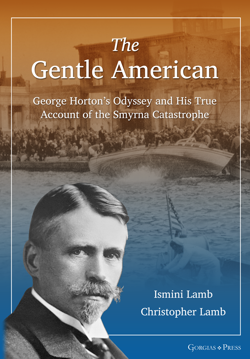Ismini Lamb

Ismini Lamb is the Director of the Modern Greek Studies Program at Georgetown University where she has taught Greek language, history, and culture for more than 30 years. Her research and courses also address social and humanitarian issues, including the recent refugee crises. For the past nine years, she has labored as the authorized biographer of George Horton. She speaks frequently on diverse issues including Horton’s historic legacy. She is a former C.S. Lewis fellow, Doyle Fellow, and has held multiple leadership positions in civic organizations.
The Gentle American
George Horton’s Odyssey and His True Account of the Smyrna Catastrophe
ISBN: 978-1-4632-4449-1
How many lives can one man save? Never enough, Horton realized. As his ship backed away from Smyrna’s wharf, he could better see the helpless, teeming crowd on the waterfront trapped between the sea and a raging inferno. He was not consoled by rescuing his shipload of refugees, nor by the many other Christian, Jewish, and Muslim lives he had saved during his service as American consul. His focus was on the people before him threatened with fire, rape, and massacre. Their persecution, he later said, made him ashamed he “belonged to the human race.” Helping them would not be easy, however. His superiors were blocking humanitarian aid and covering up atrocities with fake news and disinformation to win Turkish approval for American access to oil. When Horton decried their duplicity and hard-heartedness, they conspired to destroy his reputation. Undaunted, Horton pursued his cause until it went to the President and then Congress for decisions that would set the course for America’s emergence as a world power. At stake was the outcome of WWI, the stability and liberality of the Middle East, and the likelihood of more genocide.
$60.00 (USD)

